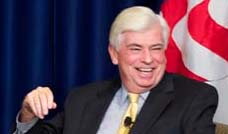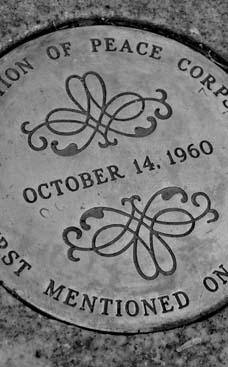
There are vast differences in the way one goes about addressing the differing needs of the Third World and the poor in America. And, these differences showed in the way Peace Corps and VISTA went about their respective businesses. It was not a question of one being the more important, or the more difficult, or even the more worthy; they were just different. During the seventies days and weeks could go by without meaningful contact between Peace Corps and VISTA. When Sam Brown tried to force his anti-poverty agenda and methodologies on the Peace Corps all hell broke loose, in the end costing Carolyn Payton her job as Peace Corps Director.
David Searles writes: Why the Peace Corps/ACTION Marriage Failed
Why the Peace Corps/ACTION Marriage Failed
from Peace Corps Worldwide Master Site Feed by David Searles
The Peace Corps of the seventies can not be understood without taking into account its relationship with ACTION, the super agency created by the Nixon administration. Much of the turmoil at PC/W during those years - there's always turmoil at PC/W - was directly caused by its forced marriage to ACTION. There was considerable rejoicing in the Peace Corps world when the relationship ended in the early eighties, but I have never read an account of why it failed. I'll give my version of the answer in this post.
ACTION was designed early in Nixon's first term to bring under one umbrella all of the federally funded volunteer programs then spread out through several federal departments, or standing on their own as independent government agencies like the Peace Corps. ACTION was to be a showcase that would demonstrate the administration's ability to streamline government, reduce overhead, and achieve synergies by linking ‘like' organizations. My guess is that the existing volunteer programs were selected for the first of several planned reorganizations because the stakes would not be very high, and in a worst case scenario nothing important would have been lost should the scheme not work out.
When I arrived for interviews in April 1971 Joe Blatchford, then Peace Corps Director, was so busy ‘creating' ACTION that I only got to shake his hand in the hallway. There was a tremendous amount of energy devoted to this reorganization task since it required congressional approval, the passage of appropriate legislation, and salving the egos of all those big wigs about to lose cherished titles. (Who would willingly accept the title ‘Associate Director, International Operations, ACTION' in place of ‘Director, Peace Corps'?) In the end, with widespread support from many sources, Peace Corps, VISTA, SCORE (the Service Corps of Retired Executives), ACE (the Active Corps of Executives), Foster Grandparents, and RSVP (Retired Senior Volunteer Program) became one under the ACTION umbrella.
The disastrous results of the marriage are best demonstrated by the overwhelming sense of relief that was present when it finally ended in 1981. People like Richard Celeste, John Dellenback, Loret Ruppe (and others with influence in the Congress and two separate administrations) had labored long and hard to regain independence for the Peace Corps. And eventually they achieved it. But the question remains: Why had this seemingly good idea been so awful?
In my mind there are two parts to the answer. The first - and this is just possibly a bum rap - is the refusal of the Peace Corps to accept guidance from anyone. The Peace Corps as an institution has always had a highly elevated opinion of itself. The purity of its mission, methods and participants has been for many of us a self-evident truth. Just ask any USAID field officer working alongside the Peace Corps and having to endure repeated snide remarks about the soft life they led in contrast to the rigors and nobility of Peace Corps life.
When the ACTION folks, many of whom had never owned a passport, tried to put their stamp on the Peace Corps they were often simply ignored. When that happened, ACTION responded with an even more assertive attempt to get control, and began to point out areas in which it considered Peace Corps to be deficient. Peace Corps bashing is a favorite sport within the agency, but woe to anyone from the outside who tries to do the same. The result was predictable: constant bickering at all levels and a case of revolving doors at the helm. During my five years, there were five Peace Corps directors and one acting director, although they were all encouraged by ACTION officials to use that title only outside the United States.
The turmoil continued during the Carter administration and the struggle between ACTION Director Sam Brown and Peace Corps Director Carolyn Payton is the stuff of legend. Once again egos were involved, but there were also matters of substance and that leads to the second reason the marriage failed.
ACTION was organized around the principlef ‘volunteerism.' The one common thread among all of the constituent parts was that each relied on volunteers to do its work. It was assumed that this thread was sufficiently strong to achieve the benefits of consolidation that ACTION promised. Unfortunately, the benefits were more apparent than real. There were such major differences in the respective missions of the component parts that they eclipsed any possible merit from a consolidation. Nowhere was this more so than in ACTION's two largest units: the Peace Corps and VISTA.
The Peace Corps in the field does two things: it provides social and economic development assistance to host countries, and creates mutual understanding and friendships between Americans and the people of the host-country. When the work of the Peace Corps is successful, the entire community benefits from the results. The poor in the Third World are not neglected, downtrodden, or despised; they are the vast majority. These people often have vibrant cultures, significant levels of happiness, and admirable value systems despite their relative lack of material possessions. The Peace Corps works in close consultation with existing institutions to set and achieve goals. The existence of an ‘us versus them' climate is carefully avoided. Cooperation is emphasized; not confrontation. Throw in differences in language, weather, health concerns, and an absence of familiar support structures and one finds the Peace Corps facing a unique challenge.
VISTA, on the other hand, was devoted to anti-poverty work in the United States, work done primarily among minority populations (minority in the sense of numbers, not necessarily in terms of race, gender, or ethnicity). These segments of the American population live in a land of plenty, but don't participate in it. They face barriers, often invisible ones, that sentence generation after generation to the same fate. Existing power structures are their enemy, not the ones with whom they work closely. The poor of the VISTA world are indeed neglected, downtrodden, and despised. A sociologist with whom I once studied tried to explain the differences she saw between ordinary Malaysians and the poor of Appalachia. Neither had much in the way of material goods or access to adequate social services yet the Malaysians had much joy in their lives while the poor of Appalachia did not. She explained that social, familial, and cultural factors are often more important that material ones; to have limited material goods in Malaysia is very different from being poor in America.
There are vast differences in the way one goes about addressing the differing needs of the Third World and the poor in America. And, these differences showed in the way Peace Corps and VISTA went about their respective businesses. It was not a question of one being the more important, or the more difficult, or even the more worthy; they were just different. During the seventies days and weeks could go by without meaningful contact between Peace Corps and VISTA. When Sam Brown tried to force his anti-poverty agenda and methodologies on the Peace Corps all hell broke loose, in the end costing Carolyn Payton her job as Peace Corps Director.
The challenges each organization faced were so very different that it never really entered anyone's mind that the other had a helpful solution. In hindsight it is astonishing that ACTION management failed to see that such a state of affairs indicated something was seriously amiss with its own organizing principle. It wasn't until 1981 that the divorce finally came through. Remarkably, ACTION continued on as a government agency until 1993 when it was submerged into another federal agency.
In summary, the forced marriage between Peace Corps and ACTION was destined to fail partly because of Peace Corps' own rather exclusionary underpinnings, but more so because Peace Corps had very little in common with the domestic side of ACTION. There is something unique about the Peace Corps, and it doesn't mix well with others. Let's keep it that way.













